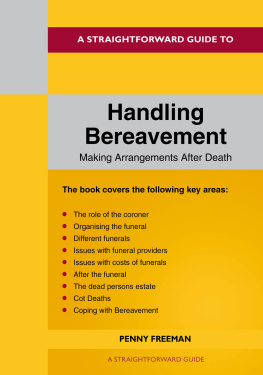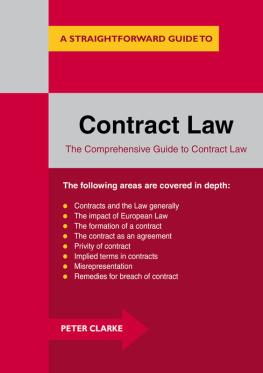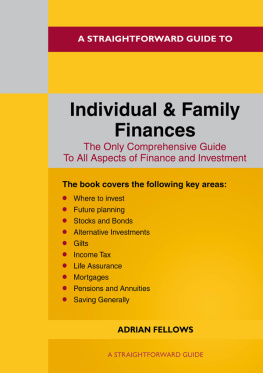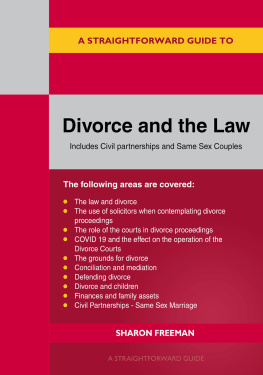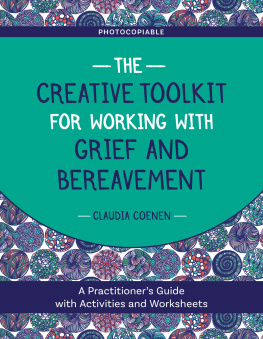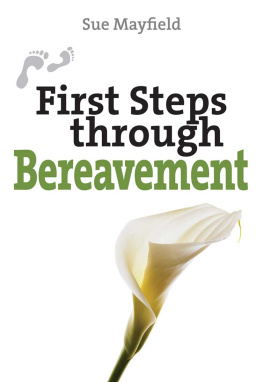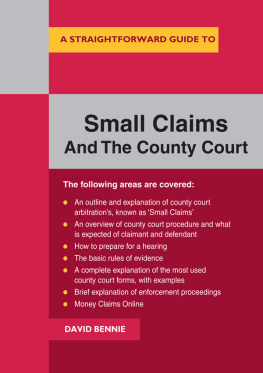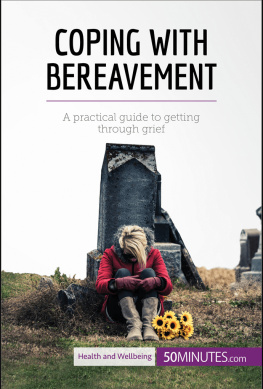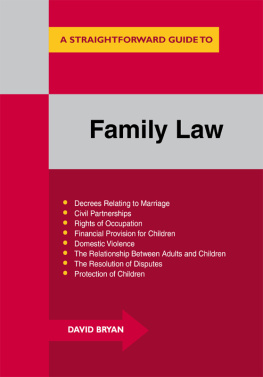Contents
Guide
HANDLING BEREAVEMENT
MAKING ARRANGEMENTS
FOLLOWING DEATH
Penny Freeman
Editor: Roger Sproston
Straightforward Guides
www.straightforwardco.co.uk
Straightforward Guides
Straightforward Co Ltd 2022
All rights reserved. No part of this book may be reproduced, in a retrieval system, or transmitted by any means, electronic or mechanical, photocopying or otherwise, without the prior permission of the copyright holder.
British Library Cataloguing in Publication Data. A catalogue record is available for this book from the British Library.
ISBN: 978-1-80236-055-4
ePUB ISBN: 978-1-80236-133-9
Kindle ISBN: 978-1-80236-140-7
Printed and bound by 4edge www.4edge.co.uk
Cover design by BW Studio Derby
Whilst every effort has been taken to ensure that the information contained in this book was accurate at the time of going to print, the publisher and the author cannot accept any liability for any inaccuracies contained within or for changes in legislation since writing the book.
CONTENTS
****
Introduction
Death is an unpleasant reality and one that many people avoid thinking about. However, on the death of a person who is close there are very necessary actions that need to be taken. This book, updated to 2022, and which now includes probate in Scotland and Northern Ireland, is an attempt to enlighten the reader as to the practical steps that need to be taken after the death of a person. Each step is outlined along with the role of the funeral director and the role of the church and crematoria after death.
The Coronavirus and the effect on funerals
The coronavirus pandemic has obviously influenced funerals and those who attend funerals. The government issued guidance on funerals and attendance at funerals on their website:
www.gov.uk/government/publications/covid-19-guidance-for-managing-a-funeral-during-the-coronavirus-pandemic.
Although restrictions have now been relaxed, basically, safety first in all aspects of organising and carrying out a funeral is still the main underlying message!
In the book, the role of the coroner is outlined and also the doctor, registrar, clergymen and cemetery and crematorium officials. This book does not dwell in depth on bereavement counselling, as this is a separate area and warrants a book on its own. It does, however, outline the process of grief and discuss aspects of this and offers advice in a limited way. The book is very much a practical guide and has been written in the hope that people may benefit from it at this difficult time.
There is a section on non-Christian burial in the recognition that the United Kingdom is a diverse multi-racial society and different traditions apply to different cultures. There is also a section on wills and probate, as dealing with an estate after death can be very complex and time consuming, particularly if there is no will. Finally, there is a list of useful addresses at the end of the book. Before we look at the practical side of handling death, we will look at bereavement generally.
Bereavement generally
Bereavement affects people in different ways. There's no right or wrong way to feel. You might feel a lot of emotions at once, or feel youre having a good day, then you wake up and feel worse again. Experts generally accept that there are four stages of bereavement:
accepting that your loss is real
experiencing the pain of grief
adjusting to life without the person who has died
putting less emotional energy into grieving and putting it into something new (in other words, moving on)
You'll probably go through all these stages, but you wont necessarily move smoothly from one to the next. Your grief might feel chaotic and out of control, but these feelings will eventually become less intense. Give yourself time, as they will pass. You might feel:
shock and numbness (this is usually the first reaction to the death, and people often speak of being in a daze)
overwhelming sadness, with lots of crying
tiredness or exhaustion
anger, for example towards the person who died, their illness or God
guilt, for example guilt about feeling angry, about something you said or didnt say, or about not being able to stop your loved one dying
These feelings are all perfectly normal. Lots of people feel guilty about their anger, but its natural to be angry and to question why.
Coping with grief
Talking and sharing your feelings with someone can help. Dont go through this alone. For some people, relying on family and friends is the best way to cope. But if you dont feel you can talk to them much (perhaps you aren't close, or they're grieving too), you can contact local bereavement services through your GP, local hospice, or the National Cruse helpline on 0808 808 1677.
A bereavement counsellor can give you time and space to talk about your feelings, including the person who has died, your relationship, family, work, fears, and the future. You can have access to a bereavement counsellor at any time, even if the person you lost died a long time ago.
Don't be afraid to talk about the person who has died. People in your life might not mention their name because they don't want to upset you. But if you feel you can't talk to them, it can make you feel isolated.
If you need help to move on
Each bereavement is unique, and you cant tell how long it will last. In general, the death and the person might not constantly be at the forefront of your mind after around 18 months. This period may be shorter or longer for some people, which is normal.
Your GP or a bereavement counsellor can help if you feel that you're not coping. Some people also get support from a religious minister.
You might need help if:
you cant get out of bed
you neglect yourself or your family, for example you don't eat properly
you feel you cant go on without the person youve lost
the emotion is so intense its affecting the rest of your life, for example you cant face going to work or youre taking your anger out on someone else
These feelings are normal if they dont last for a long time. The time to get help depends on the person, if these things last for a period that you feel is too long, or your family say theyre worried, thats the time to seek help. Your GP can refer you, and they can monitor your general health.
Some people turn to alcohol or drugs during difficult times. Get help cutting down on alcohol, or see the Frank website www.talktofrank.com for information on drugs.
The Death Caf Movement
Inspired by the work of Bernard Crettaz, a Swiss Sociologist, John Underwood, the Founder of the Death Caf Movement created the first Temporary Death Caf in 2011 in the basement of his home in London. The movement quickly spread to over 4000 temporary Cafes throughout the world.
The idea is that people can discuss all aspects of death, from the practical aspects i.e., what to do when someone dies and also sharing tales of bereavement, such as personal experiences and also ones own view of death. The overall aim is to allow people to be open about death and all that surrounds it.
To find out more and locate a Death Caf near to you go to deathcafe.com
Pre-bereavement care
If someone has an incurable illness, they and their loved ones can prepare for bereavement. Bereavement counsellors offer pre-bereavement care, helping patients and their family cope with their feelings. This can be especially important for children, childrens stress levels are at their highest before their family member dies, so support during this time is important.

